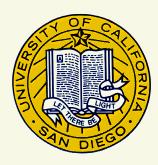Those of you who are recently naturalized or green card holders (as well as those of you who have two naturalized parents), should be giving some careful thought to the
Paul and Daisy Soros Fellowships for New Americans, which provide a $20,000 stipend and half tuition for two years of graduate study to those in professional and master's programs, in addition to Ph.D. candidates. I just attended a very informative talk by Warren Ilchman, the foundation officer for this fellowship, and he delved deeply into the meanings of the various criteria for selection, as well as providing a general message that all of us could stand to remember: in competitive fellowship rounds, readers are looking for reasons to exclude you, not include you. Which isn't to say that one part of your application can't be weaker than the rest, but that the other parts have to outshine it (or, barring that, you need to provide some reasonable explanation for why your GRE scores are bad or your GPA is a running a little shy of a 3.5).
He also provided a very helpful hierarchy of the difficulty of prestigious fellowship interviews. To wit, in decreasing levels of pressure and ability to create and propagate sweaty terror: Rhodes, Truman, Marshall, Soros. Just something for you undergraduates to keep in mind when you're applying. I got the impression that GRE scores were a bit more important to the decision-makers than stratospheric GPAs, but that might have been a mere impression.
As for the criteria, Ilchman elaborated, with examples, on some of the fuzzier terms:
Creativity: His example led me to believe that founding something or taking initiative, instead of simply joining something, was the key to scoring high in this category. He said that the foundation is tired of seeing long lists of standard activities from applicants, i.e. Habitat for Humanity, Amnesty International, etc. You could score points in this category by being unusual in some way or another, and writing about it well.
Accomplishment: Do something really well, or work really hard at it. Those of you who haven't founded anything but work assiduously for some cause or another--this is your category. Pile on your examples, and talk about what they meant to you.
Commitment to the U.S. Constitution and Bill of Rights: This, contrary to its somewhat strange nomenclature, is actually not a political litmus test but a call for active citizenship. Here's your opportunity to talk about your political protesting, letter writing campaigns, and how you single-handedly registered all of the voters in a small Mississippi Delta town during summer vacation last year. I'd also encourage potential applicants to remember that Paul Soros is
George Soros's brother, so political engagement of a contrarian kind might fall on particularly receptive ears.
Trajectory: Ilchman usefully contrasted "distance traveled" and "the use of opportunities." Since not everyone is so fortunate as to be born unfortunate, you don't necessarily need to talk about how you slept in your car for five years or attended schools that actually had need of those metal detectors for a purpose other than creating the illusion of security (but if you did, talk about it!) Those born in four-bedroom Everywhere, America houses to two happily married parents and 1.2 siblings can score points in this category by showing that they did something with their backgrounds that exceeded even the privileges conferred by it, like Ilchman's example: a young woman who was one of only seven people in the history of Harvard Med to make summa cum laude. The general rule, for this fellowship and others, is that those with privilege need to demonstrate that they weren't content to do internships with Mummy or Daddy's company over the summer: they also collected books for ruined African libraries.
Anyone interested in this fellowship who wants more inside information should give me a call, send an email, or make an appointment. If you want to read more about scholarships/fellowships in general, from the perspective of those who award them, check out
The Lucky Few and the Worthy Many, a book Ilchman co-authored about the subject. I'll be willing to loan my copy out in a week or so, after I've finished reading it.

